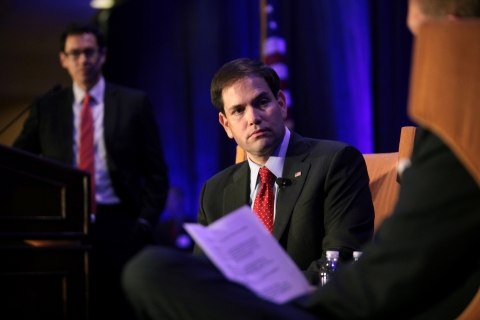
The Maryknoll Office for Global Concerns joined a letter to Trump nominee for Secretary of Sate, Senator Marco Rubio, requesting he prioritize ending the violent crisis in Sudan through nonviolent interventions.
Photo of Senator Marco Rubio speaking at luncheon in Phoenix, Arizona, by Gage Skidmore via Flickr.
The Sudanese American Physicians Association, an organization made up of physicians of Sudanese descent living and working within the United States, organized a letter to President-elect Trump’s nominee for Secretary of State, Senator Marco Rubio, detailing their recommendations for U.S. policy to protect civilians in Sudan and end the war. Thirty faith and civil society organizations signed the letter, including the Maryknoll Office for Global Concerns.
In the aftermath of the 2019 revolution in Sudan, Senator Rubio led a bipartisan resolution expressing support for the transition to a civilian-led government in African country. Fighting between the Sudanese Armed Forces (SAF) and the Rapid Support Forces (RSF) since April 2023 has derailed the transition and created the world’s largest displacement and hunger crisis.
“Civilians have been both caught in the crossfire and directly targeted” the physicians’ letter says. “Mass atrocities, gross human rights violations, food insecurity, and climate-related disasters have forcibly displaced more than 11 million people from their homes. More than half the country is in desperate need of humanitarian assistance, with several areas across Sudan at risk of famine.”
In addition to humanitarian concerns and democratic aspirations, the situation in Sudan should be a national security concern for President Trump’s administration, the letter states. “With violent extremist groups spreading across the Sahel, the U.S. cannot afford to let Sudan devolve into a failed state, providing these groups with access to the Red Sea.”
The 2024 Director of National Intelligence’s Annual Threat Assessment stated, “With Sudan at the crossroads of the Horn of Africa, the Sahel, and North Africa, it could once again become an ideal environment for terrorist and criminal networks.”
The physicians group also raise concerns about actions by China and Russia in the conflict. “Both countries have a history of supplying arms to Sudan,” the letter states. “China has been a top importer of Sudanese oil and has invested billions in Sudan’s energy sector, and Russia is seeking to establish a naval base near Port Sudan.”
The physicians group recommends four actions by the United States to protect civilians, end the war and promote democracy in Sudan.
Increase Diplomatic Pressure on External Actors Fueling the War: The reason the conflict in Sudan has been able to continue for more than a year and a half is due to the support external actors are giving the warring parties. A concerted diplomatic effort must be made to engage with each of these external actors to use their influence over the parties to reach a diplomatic solution.
Appoint a Special Envoy: The situation in Sudan requires high-level bilateral and multilateral diplomatic engagement to ensure humanitarian access, a diplomatic solution to end the war, and a transition to a civilian-led government. A Special Envoy for Sudan is best positioned to coordinate Sudan policy at the highest levels and engage with Sudanese civil society to achieve peace in Sudan. All future negotiations and processes must have inclusive representation of youth, civil society, and women in line with the Women, Peace and Security Act of 2017, of which Sen. Rubio was a cosponsor.
Prioritize Support to Local Aid Providers: Sudanese civil society has proven to be capable, efficient, and effective at delivering humanitarian aid, healthcare, and protection services despite the extremely difficult operating environment. Many of these locally led initiatives have been able to secure access when large international organizations could not. The State Department and USAID should prioritize streamlining the process to support Sudanese NGOs, emergency response rooms, community kitchens, and other local initiatives.
Support Documentation of Atrocity Crimes and Gross Human Rights Violations: A long history of impunity is a major contributing factor to the current crisis in Sudan. The same men who never faced justice for genocide, war crimes, and crimes against humanity committed in Darfur, Blue Nile, South Kordofan, and elsewhere are leading this current war and committing a new wave of atrocity crimes. Accountability must be a priority after the war is brought to an end. Investments must be made now to support local documentation efforts and archives to prepare for eventual trials and tribunals. To that end, local NGOs have been pivotal in documenting human rights abuses and atrocities committed across the country and need financial and logistical support to continue their necessary work.
Glenn Hamer and U.S. Senator Marco Rubio of Florida speaking at the Arizona Chamber of Commerce & Industry's Leadership Series luncheon in Phoenix, Arizona.
